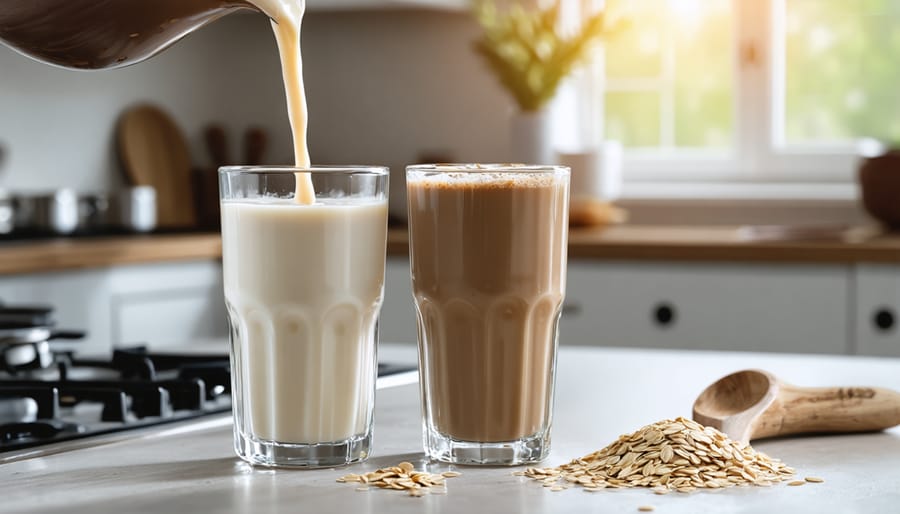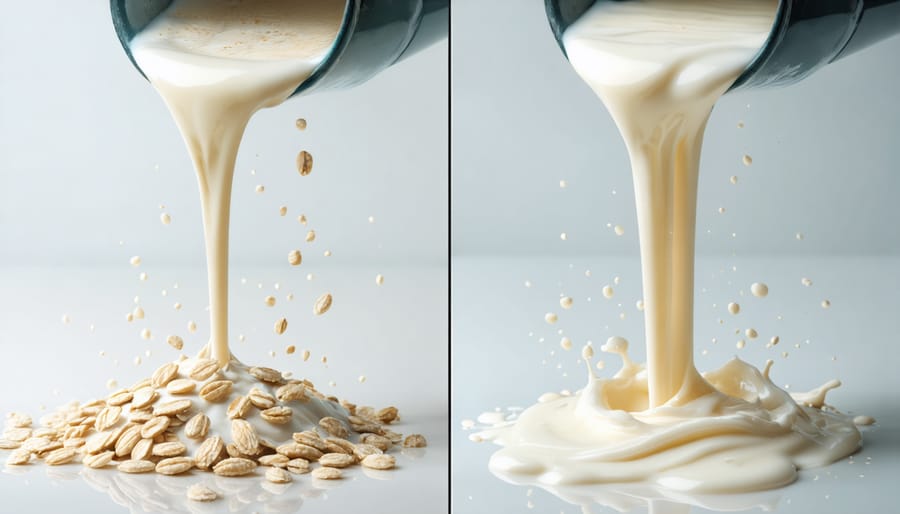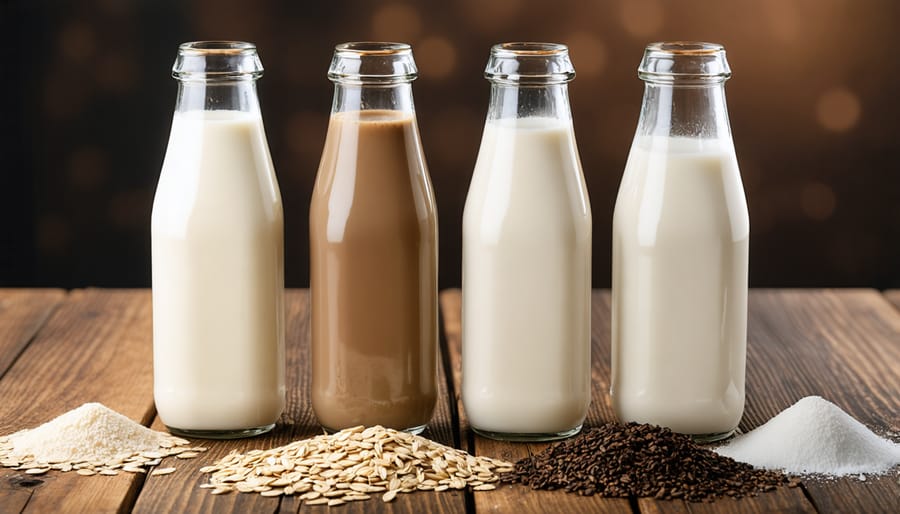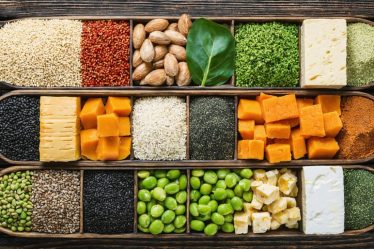
Looking for the perfect dairy-free milk can feel overwhelming, but science and countless taste tests point to one clear winner: oat milk stands as the closest match to traditional dairy milk. As someone who spent years exploring plant-based alternatives, I’ve discovered that oat milk’s creamy texture, neutral taste, and remarkable versatility make it nearly indistinguishable from dairy milk in everything from morning coffee to baked goods. Its protein content and molecular structure create that signature silky mouthfeel we all miss when switching from dairy, while its natural sweetness mirrors the flavor profile of whole milk. Whether you’re lactose intolerant, embracing a vegan lifestyle, or simply curious about dairy alternatives, oat milk offers that familiar comfort of traditional dairy without compromise – and I’m excited to show you exactly why it’s become the gold standard in dairy-free options.
Why Oat Milk Wins the Dairy-Free Race

The Science Behind That Creamy Texture
Ever wondered why oat milk feels so creamy in your coffee or smoothies? It’s actually quite fascinating how this plant-based milk manages to replicate that luxurious dairy sensation we all know and love. The secret lies in oat milk’s unique molecular structure, particularly in its beta-glucans – natural sugars that give oats their characteristic heartiness.
When oats are blended with water during the milk-making process, these beta-glucans work their magic by creating a network of molecules that trap water and other compounds. Think of it like a microscopic spider web that holds everything together in just the right way. This natural process results in that silky, smooth texture that feels so familiar on your tongue.
The proteins and starches in oats also play their part. During production, they undergo a careful breakdown that releases natural compounds, creating that subtle sweetness and rich mouthfeel we associate with dairy milk. It’s like nature’s own chemistry experiment happening right in your glass!
What makes this even more special is that this creamy texture isn’t artificial – it’s completely natural. Unlike some other plant-based alternatives that rely heavily on additives to achieve a milk-like consistency, oat milk’s creamy texture comes from the oats themselves. Pretty cool how Mother Nature figured this one out, right?
Nutritional Profile: How It Stacks Up
When it comes to matching dairy milk’s nutritional benefits, oat milk stands out from the crowd. While no plant-based alternative perfectly mirrors cow’s milk’s nutritional profile, oat milk comes impressively close, especially when fortified.
A cup of fortified oat milk typically contains 120 calories, 3 grams of protein, 5 grams of healthy fats, and 16 grams of carbohydrates. Like dairy milk, it’s an excellent source of calcium, with many brands providing 35% of your daily needs. It also delivers similar amounts of vitamin D, vitamin A, and vitamin B12 – nutrients traditionally associated with dairy.
One area where oat milk particularly shines is its fiber content, offering 2-4 grams per serving – something dairy milk doesn’t provide at all. It’s also naturally rich in beta-glucans, which support heart health and help maintain steady blood sugar levels.
The protein content is lower than dairy milk’s 8 grams per cup, but many brands now offer protein-fortified versions that help bridge this gap. If you’re watching your calories, unsweetened varieties contain similar amounts to 2% dairy milk, making it an excellent choice for those mindful of their daily intake while still craving that creamy, satisfying texture we all love in our morning coffee or breakfast cereal.
Making the Switch: Practical Tips
Coffee, Tea, and Beyond
When it comes to your morning coffee ritual or afternoon tea break, finding the perfect non-dairy alternative can make all the difference. Oat milk has emerged as a favorite among baristas and home brewers alike, thanks to its creamy texture and ability to foam beautifully for lattes and cappuccinos. It doesn’t separate in hot beverages like some alternatives, and its subtle sweetness complements rather than overpowers your drink.
For tea lovers, oat milk’s neutral taste works wonderfully in both black and herbal varieties. It adds a smoothness that’s remarkably similar to dairy milk, without the heavy feeling. If you’re a matcha enthusiast, you’ll be pleased to know that oat milk’s consistency helps create that perfect, clump-free blend.
Beyond hot beverages, this versatile alternative shines in smoothies, protein shakes, and even golden milk lattes. Pro tip: for the best results in hot drinks, warm your oat milk gently and avoid overheating, as this can affect its creamy texture. Looking for that perfect foam? Choose barista-specific versions, which are specially formulated for professional-quality drinks at home.

Baking and Cooking Success
When it comes to using oat milk in your kitchen adventures, you’ll be delighted to know it’s one of the most versatile non-dairy alternatives available. I’ve found that oat milk’s creamy texture and neutral taste make it perfect for both sweet and savory dishes. To get the best results, try these baking and cooking techniques that I’ve perfected through countless recipe tests.
For baking, use oat milk in a 1:1 ratio to replace dairy milk. Its natural sweetness and protein content help create that perfect golden-brown crust on breads and provides wonderful moisture to cakes and muffins. When making pancakes or waffles, let the batter rest for about 5 minutes after mixing – this allows the oats to work their magic, resulting in fluffier results.
In savory dishes, oat milk adds a lovely creaminess to soups and sauces without splitting. Just remember to heat it gently and avoid boiling, as this can affect its texture. For the smoothest results in hot beverages like lattes, choose barista-grade oat milk, which has been specifically formulated to withstand high temperatures without separating.

Choosing Your Perfect Match
Let’s be honest – walking into the plant-based milk section can feel a bit overwhelming! With so many oat milk brands lining the shelves, finding your perfect match might seem tricky at first. But don’t worry – I’ve got you covered with some tried-and-true tips from years of taste-testing and community feedback.
For that classic milk experience, Oatly’s Full-Fat version is often praised for its creamy texture and neutral taste. If you’re a coffee lover (like me!), their Barista Edition creates the most beautiful foam for your morning latte. Planet Oat’s Original variety tends to be a crowd favorite for everyday use, especially in cooking and baking.
When choosing your oat milk, consider these key factors:
– Ingredient list: Look for brands with minimal additives
– Sugar content: Many brands offer unsweetened options
– Fortification: Some varieties include added calcium and vitamins
– Intended use: Barista blends for coffee, regular versions for everyday use
– Price point: Store brands can offer great value without sacrificing quality
Pro tip: Start with a smaller carton to test how you like a particular brand before committing to the larger size. And remember, it might take trying 2-3 different brands before finding your perfect match – that’s totally normal! Most people I know who’ve made the switch actually prefer their chosen oat milk over dairy now.
As we’ve explored, oat milk stands out as the closest non-dairy alternative to traditional milk, offering that creamy texture and versatile nature we all love. Its similarity to dairy milk in both taste and functionality makes it an excellent choice for everything from your morning coffee to baking adventures. Whether you’re lactose intolerant, following a plant-based lifestyle, or simply curious about dairy alternatives, oat milk provides a sustainable and delicious option that doesn’t compromise on taste or nutritional benefits.
I encourage you to give oat milk a try in your daily routine. Start with a splash in your coffee or tea, experiment with it in your favorite recipes, or simply enjoy it cold in a glass. You might be surprised at how seamlessly it fits into your lifestyle. Remember, making sustainable choices doesn’t mean sacrificing flavor or convenience – sometimes it just means being open to delicious new possibilities like oat milk.



